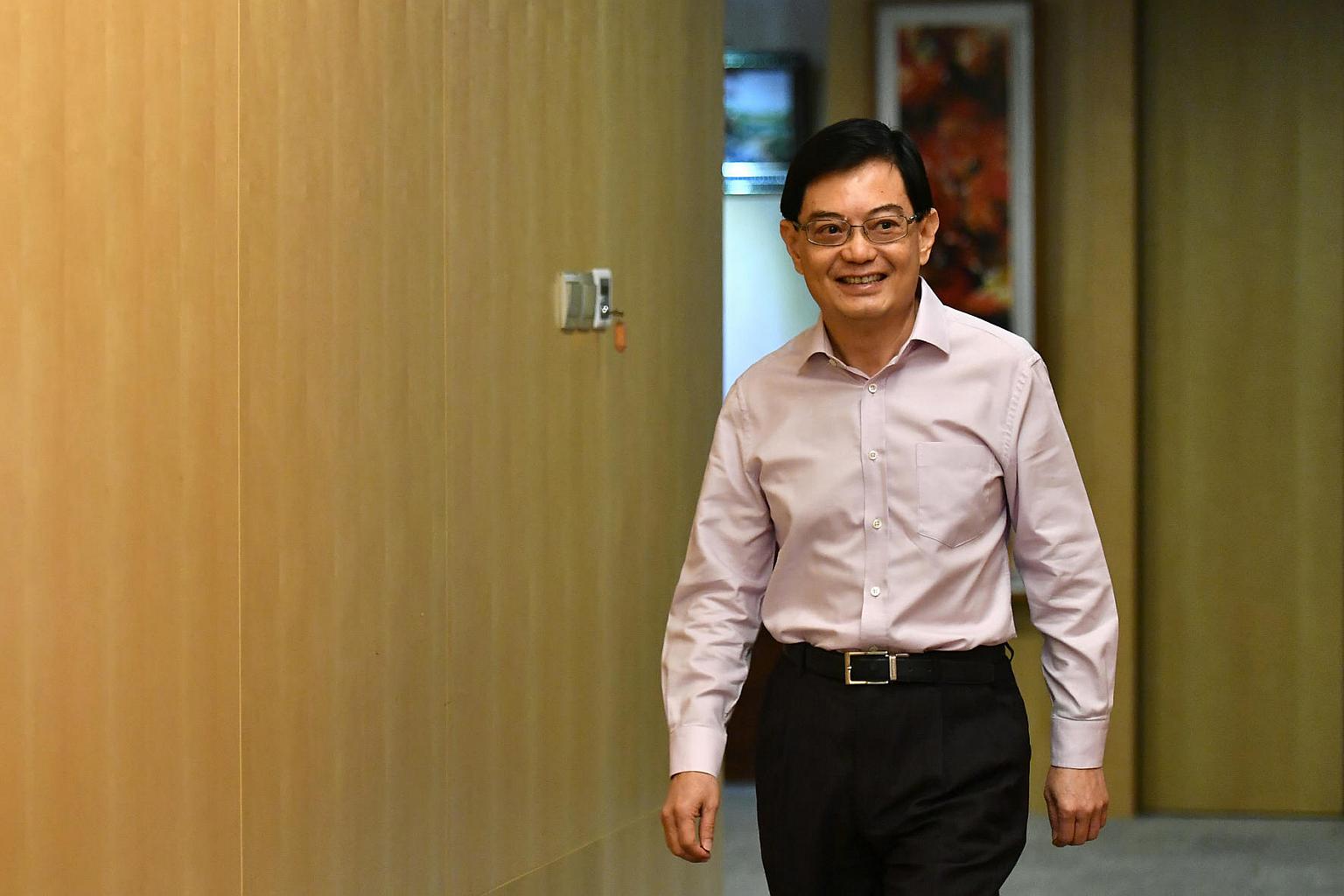Heng Swee Keat's first words when out of coma: Is there a Cabinet meeting today?
He scribbled words on paper as he could not speak yet with a tube down his windpipe
Sign up now: Get ST's newsletters delivered to your inbox

Finance Minister Heng Swee Keat in his first interview since returning to work after suffering a stroke in May.
ST PHOTO: LIM YAOHUI
When Finance Minister Heng Swee Keat woke up from his coma six days after a severe stroke in May, he could not speak.
The reason: doctors had slid a tube down his windpipe to help him breathe, as he had a lung infection.
Forced to write what he wanted to say, he turned to pen and paper. Among the first words he scribbled: "Is there a Cabinet meeting today? Where are the papers?"
Mr Heng, well known for his dedication to work, was back.
On May 12, during a regular Cabinet meeting, he had collapsed suddenly from a ruptured aneurysm.
Swiftly, he was taken to Tan Tock Seng Hospital, where he had surgery to seal off the localised swelling in the wall of an artery in his brain.
Almost seven months later, Mr Heng, 55, looked none the worse for wear when he gave his first extensive interview last Tuesday.
He was steady in stride and speech, and relaxed as he recounted his experience.
"I am just very grateful that I can resume my functions and I can go back to work," he said. "I've learnt that it is important to stay motivated and to keep trying, even if it means taking it one small step at a time."
It is hard to tell that Mr Heng has had an aneurysm, which kills 40 per cent of sufferers and often leaves survivors with permanent damage.
He has been back at work since August and has not had to change much of his daily routine, other than avoiding crowded places and large meetings while his lungs, weakened by an infection he caught in hospital, are on the mend.
The only giveaway? Slight weight loss.
Making a light-hearted joke about the pink shirt he was wearing, he quipped: "It's one of the shirts which the tailor made more tight-fitting, so I complained. But now it's okay!"
The hour-long interview ranged from the deeply personal experience of his road to recovery to the work of the Committee on the Future Economy, which he chairs.
He was sanguine even when he spoke of difficult moments, like having to learn to swallow food the correct way: It was initially strange to have someone watching while he ate, but "okay, better be safe".
A stroke can damage muscles in the face, throat and neck, and it is not uncommon for stroke patients to experience difficulty swallowing. It can lead to food entering the airway and lungs, causing pneumonia.
But Mr Heng was, however, most at ease when he spoke on the state of the economy, an issue close to his heart.
While he did not return to his office at The Treasury immediately after he was discharged from hospital on June 25, six weeks after his stroke, he had kept abreast of current events in what has turned out to be a challenging year with global terrorism on the rise and a general slowdown of the world economy.
He acknowledged the creeping anxiety among Singaporeans, and pledged to "turn that anxiety into action that will prepare us better for the future".
When he took ill, many wondered if it was excessive work that caused his stroke, with his fellow ministers and MPs pointing to his punishing schedule.
Asked if Prime Minister Lee Hsien Loong had promised to give him less work since the episode, he said: "I won't say that he gave me too much work. That won't be a correct characterisation. He was very, very supportive."
His own doctors had been somewhat surprised about his stroke, given that he had exercised regularly and never exhibited typical risk factors like high blood pressure.
"Whether it's overwork, personally I don't think so. But then, it's difficult to be definitive about such things because some of these things, you may not even feel it," he said. "Some aspects of life are just, you know, unpredictable."
His family had borne the brunt of his stroke during the most difficult moments, when he was "totally unaware of what was happening", he said. But they too had not pressured him to stop working.
"They encourage me to do whatever that I find meaningful... It was not a long discussion on whether I should get back to work," he added.
The minister, identified by PM Lee as a key member of the future leadership team, is tipped to be among the contenders to be the next prime minister, and his stroke had put the spotlight on Singapore's leadership succession plans.
Mr Heng declined to be drawn into discussing whether he would accept the top job if his colleagues wanted him to, saying: "This is a hypothetical question."
He, however, said that to stop serving was never an option.
Helping Singapore to do well is where his priorities continue to lie, and his health scare has not changed that.
"I'm very grateful for what I have in Singapore, and I think it's important that we do our part and continue to create a better future for our people."
•In tomorrow's paper: Mr Heng Swee Keat speaks on the economy.


